[Español]
Buenas steemians! espero todos hayan comenzado su semana con buen pie, yo en lo personal me quedo asombrado de lo rápido que pasan los días, poco a poco pero con una sutil velocidad nos aproximamos al último día del mes de Octubre en el cual se celebra la festividad de Halloween; Debo admitir que en mi país (Venezuela) esta festividad (la cual tiene orígenes anglosajones) realmente no es muy popular, al menos durante mucho tiempo no lo fue y no fue sino hasta mediados de la década de los 2000's que las personas comenzaron a desarrollar un poco más de conocimientos sobre dicha festividad y en cierta forma practicarla; Aunque honestamente la mayoría solo se remiten a prácticas netamente comerciales cómo: hacer fiestas de disfraces con decoraciones de murciélagos o arañas y calabazas para tomarse fotos y subirlas a sus redes sociales, ignorando casi por completo los orígenes y muchos otros rituales de esta bonita tradición. Habiendo dicho esto hablemos un poco sobre ella ¿de que se trata el Halloween?
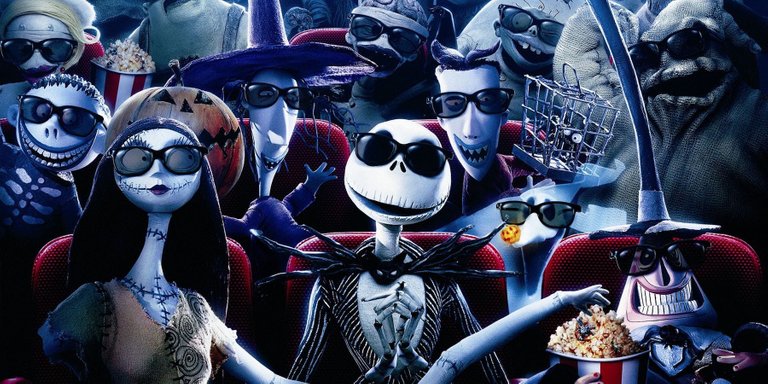 (Nightmare before Christmas o como se conoce en latinoamerica El extraño mundo de Jack, es un icono mundial de estas festividades)
(Nightmare before Christmas o como se conoce en latinoamerica El extraño mundo de Jack, es un icono mundial de estas festividades)
Bien, en primer lugar demos un vistazo al nombre de la celebración en sí y su etimologia, el término o la palabra "halloween" como dije anteriormente tiene orígenes anglosajones, es decir que sus raíces están ligadas a culturas que hablaban una variedad de lenguas ajenas a las latinas, principalmente el inglés; Esta palabra de hecho es una contracción y originalmente el nombre usado fue "All Hollow Tide" derivada de otras dos palabras provenientes del inglés antiguo: "halig" lo cual hoy en dia seria "holy" ("sagrado o santo" en español) y la palabra "tide" modernamente conocida como "time/season" ("tiempo/temporada" en español).
Es curioso el hecho de las discrepancias que existen referente al origen de estas festividades, muchas personas se lo acreditan a muy antiguos rituales y festivales celtas para las cosechas, particularmente un festival conocido como Samhain practicado por los pueblos gaélicos de Irlanda, Escocia y la Isla de Mann; Este se realizaba para celebrar el final de la época para cosechar (o el verano) y dar paso al invierno y la parte del año más oscura, comenzaba el treinta y uno (31) de Octubre y terminaba el primero (1) de Noviembre, estas fechas delimitaban la mitad entre el equinoccio de otoño y el solsticio de invierno y tenía gran importancia para estos pueblos y sus calendarios que eran totalmente distintos a los que usamos en la actualidad; Esto se hace evidente si tomamos en cuenta que en Irlanda existen varias estructuras mortuorias las cuales se alinean perfectamente con el sol del amanecer durante la época de Samhain. En estos periodos por ejemplo: el ganado, debido a que el invierno se acercaba era sacrificado y recolectado como alimento, todo hecho bajo rituales en los que se encendían hogueras especiales que se creía traerian condiciones de protección y limpieza. Estas antiguas culturas celtas tenían la creencia de que durante estos días los límites entre este mundo y el "otro-mundo" se hacían más propensas para cruzar, dejando así pasar con más facilidad a los espíritus, hadas y deidades o como ellos los conocían los "Aos Sí". La intención entonces era agasajar y complacer a los espíritus de la naturaleza para asegurar que los pueblos y sus recursos se mantuvieran en buen estado durante el invierno. Uno de estos rituales en específico se mantiene hoy en día (aunque con propósitos y detalles evidentemente distintos) en el cual durante las festividades las personas se disfrazaban como dichas deidades e iban de hogar en hogar recitando versos y canciones a cambio de comida (dulce o truco!). entre otras prácticas que se hacían durante estos días estaban las de adivinaciones del futuro y juegos. Los estudiosos de estos temas consideran que de hecho Samhain representaba el año nuevo celta.
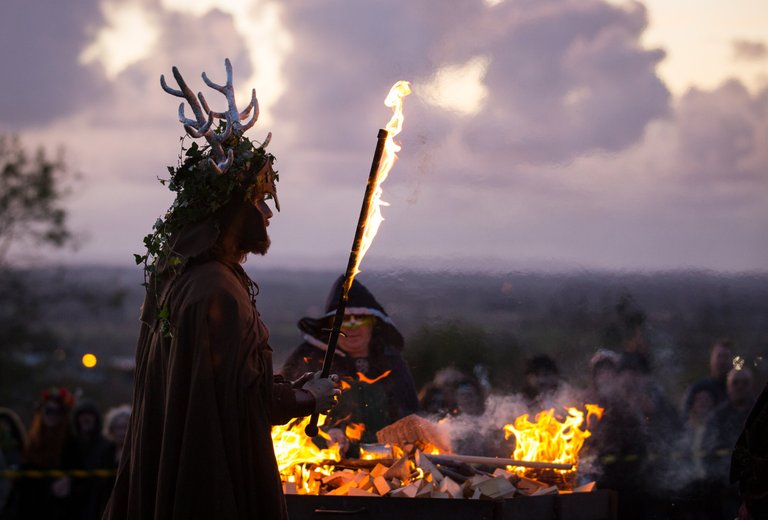
Ahora sin embargo otro gran número de personas le dan el crédito al cristianismo, indicando que esta celebración según la tradición cristiana es una triada que comienza el treinta y uno (31) de Octubre con la víspera de todos los santos (all hallow's eve) para continuar por dos días más, el primero (1) y el segundo (2) de Noviembre respectivamente como: el día de todos los santos (all hallow's day) y el dia de todas las almas (all souls' day). En los cuales se mantiene vigilia para honrar a todos los santos, mártires y específicamente los devotos cristianos que han muerto. Se hace obvio entonces, al menos para mi, que durante las primeras épocas del cristianismo cuando este culto hacia su expansión a lo largo de toda Europa y encontraron pueblos como los gaélicos y sus tradiciones las cuales segun la filosofia cristiana debieron ser definitivamente paganas, no tuvieron otra opción que en cierta manera absorberlas y manipularlas o digamos "hacerlas cristianas" para así incluir estos pueblos y sus muy antiguas tradiciones a su fe.
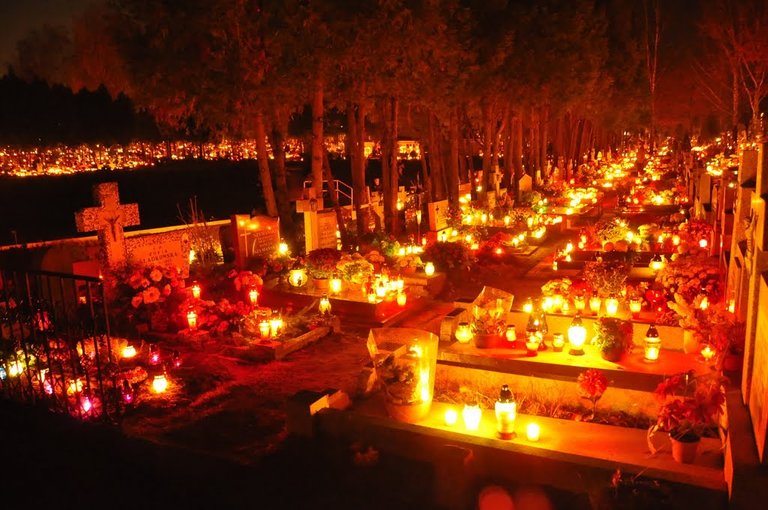
Los tiempos modernos son evidentemente muy distintos de los tiempos de las tribus gaélicas o los primeros cristianos europeos, hoy en día aunque en las partes nórdicas del planeta los inviernos siguen siendo fríos y duros, el estado de las sociedades garantizan comodidad y supervivencia para todos o al menos la gran mayoría de las personas, dejando así a estas sin necesidad de rendir homenaje o complacer a muertos y hadas. Entonces, ¿por qué siglos luego de que estos rituales dejaron de tener utilidad para los seres humanos seguimos practicandolos? En primer lugar diría que específicamente para los irlandeses, escoceses y otros grupos étnicos descendientes de estas tribus o para los cristianos devotos es cuestión de tradición y homenaje a los ancestros, además de que participar en dichos rituales y festividades son ocasiones excelentes para compartir y conectar con otras personas y formar parte de una comunidad. El caso anterior es válido también para la cultura venezolana o latinoamericana en general, el deseo de pertenecer a algo y disfrutarlo en compañía de otras personas es algo inherente en todos los seres humanos y siempre estaremos buscando razones o situaciones para crear momentos que tengan significado para nosotros.
Al comienzo de esta publicación dije que en Venezuela el halloween no se popularizó sino hasta comienzos o mediados de la década de los 2000 y es interesante ya que este caso parece aplicar para muchos otros países, por ejemplo: en Alemania el halloween comenzó a celebrarse a finales de la década de los 90, especialmente en el vecindario de Dahlem en la ciudad de Berlín, donde los niños salen a las calles con disfraces a pedir dulces, cabe destacar que este vecindario está habitado en buena parte por inmigrantes norteamericanos que llegaron allí durante la guerra fría y hoy día se estima que estas festividades generan doscientos (200) millones de euros a través de múltiples industrias. El mismo caso se repite en Grecia y en Japón, países geográfica y culturalmente distantes de las tribus gaélicas que comienzan súbitamente a celebrar estas festividades, otra vez todo gracias a la cultura pop norteamericana que ha llegado a muchísimos lugares del mundo a través de medios como la televisión o el internet. Otros países como China y México también tienen sus días para honrar a los muertos, aunque en fechas distintas; Para los chinos es a mediados de julio y los mexicanos el primero (1) de Noviembre, claramente la muerte es un tema en común que todos los pueblos comparten.
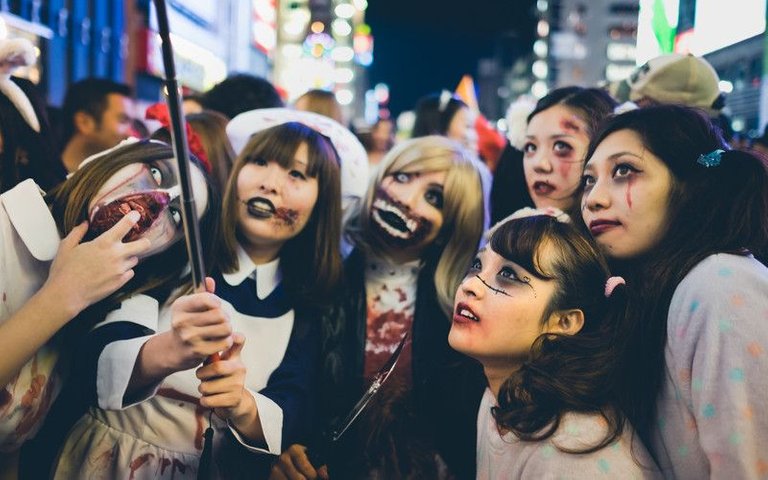
(Algunas adorables zombies japonesas)
En cualquiera de los casos, como ya mencione antes, los seres humanos siempre buscaremos la manera de generar situaciones para unirnos a otros y pasar un buen rato, esto me parece genial, poco a poco el mundo a través de los medios de comunicación pareciera transformarse en una aldea global con una cultura mundial que todos los pueblos parecen reconocer como válida, sin embargo debo decir que cuando hacemos las cosas por el simple hecho de hacerlo y actuando bajo lo que está de moda con fines puramente comerciales y materiales, actuamos con una intención que genera una vibra de ignorancia y sumisión, mi recomendación es que siempre que queramos participar en algo investiguemos y aprendamos lo más que podamos sobre ello, entonces asi podremos darle aún más significado personal y disfrutarlo mucho más. Desde mi punto de vista el halloween es una festividad muy interesante, útil y divertida, tener consciencia de los muertos y nuestra propia mortalidad es algo muy saludable y poder compartir estas ideas con otras personas lo es aún más. Esta es la razón principal detrás de esta publicación, espero que todos estos conocimientos sean de ayuda para cualquier persona en el mundo que esté interesada en saber más sobre estas celebraciones y sobretodo en mi país natal donde aún se ignoran muchos de estos detalles. De hecho por lo general el treinta y uno (31) de Octubre en Caracas recientemente se ha estilado hacer algo conocido como "La marcha zombie" en donde muchas personas se reúnen con sus mejores disfraces de muertos y salen a las calles a divertirse, espero que este año sea así y en dado caso compartiré esta experiencia con ustedes, ya que esta es la primera de muchas publicaciones relacionadas con el halloween, ocultismo, paganismo, historias de terror y películas de miedo, incluso hablaré sobre el mismísimo satán en algunas ocasiones, todo esto durante este mes.
Este viernes estaré nuevamente publicando mi segmento #Alpventetopmusicrecords en el cual hablo y reseño tema por tema un disco específico que considero influenció sobre mi como persona y músico, esta semana hablare sobre una banda que conceptualmente siempre ha estado muy ligada al horror y la muerte, por ahora no diré cual es la banda, pero si les dare una pista. Este es Frank Iero, uno de los dos guitarristas de dicha banda. Frank nació el día de Halloween en el año 1981 y es genial! admiro mucho su manera de cantar y tocar la guitarra como también su estilo de componer canciones, en algunas entrevistas que tuve la oportunidad de ver, el menciona que haber nacido ese día definitivamente lo influenció como artista, ¿que piensan ustedes?, ¿creen que por haber nacido en la víspera de los muertos Frank este de cierta forma mejor conectado con los espíritus?, ¿conocen a alguien que también haya nacido en ese dia? espero con ánimo sus comentarios!
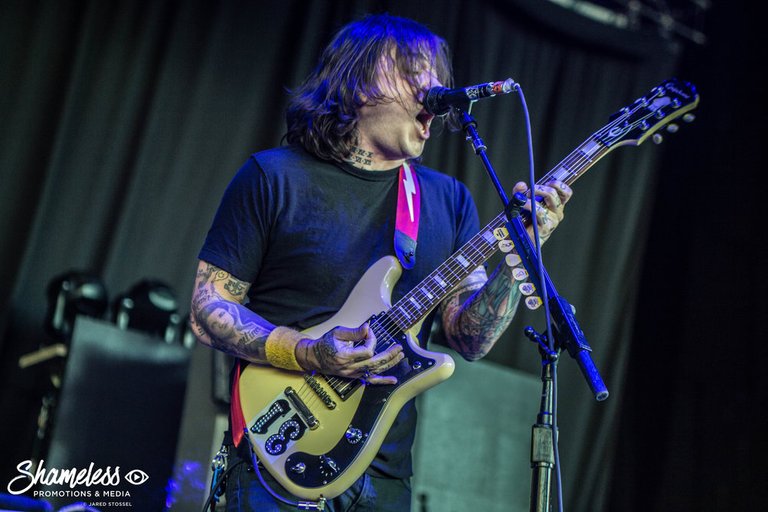
(Aqui les dejo un tema solista de Frank Iero que definitivamente captura la vibra de estas vísperas, y fue usado en el soundtrack de la pelicula animada Frankenweenie)
Finalmente me despido de ustedes deseandoles una bonita noche, dia o mañana dependiendo del momento del día en que se encuentren ahora, un saludo a los creadores de @steempeak y agradecimientos absolutos por haber creado esta interfaz tan cómoda que me permite publicar sin complicarme demasiado.
Con cariño Luis Puente.
[English]
Greetings steemians! I hope you're all having a great start of the week, I am personally amazed at how quickly the days go by, little by little but with a subtle speed we approach the last day of the month of October in which the holiday of Halloween is celebrated; I must admit that in my country (Venezuela) this holiday (which has Anglo-Saxon origins) is really not very popular, at least for a long time it was not and it was not until the mid-2000s that people evolved a little more knowledge about this holiday and started celebrating it; Although honestly the majority only refer to purely commercial practices such as: making costume parties with decorations of bats or spiders and pumpkins to take pictures and upload them to their social networks, almost completely ignoring the origins and many other rituals of this beautiful tradition. Having said this let's talk a little about it, what is Halloween about?
 (Nightmare before Christmas or as it is known in Latin America The strange world of Jack, is a worldwide icon of these festivities)
(Nightmare before Christmas or as it is known in Latin America The strange world of Jack, is a worldwide icon of these festivities)
Well, first let's take a look at the name of the celebration itself and its etymology, the term or the word "Halloween" as I said earlier has Anglo-Saxon origins, that is to say that its roots are linked to cultures that spoke a variety of languages different to the Latin ones, mainly English; This word is in fact a contraction and originally the name used was "All Hollow's Tide" derived from two other words from ancient English: "halig" which today would be "holy" and the word "tide" modernly known as "time / season"
Curious fact is that there are discrepancies regarding the origin of these festivities, many people accredit it to very old Celtic rituals and festivals for harvests, particularly a festival known as Samhain practiced by the Gaelic peoples of Ireland, Scotland and the Isle of Mann; This was done to celebrate the end of the time to harvest (or summer) and give way to winter and the darkest part of the year, beginning on October thirty-first (31) and ending on the first (1) of November, these dates delimited half between the autumn equinox and the winter solstice and had great importance for these tribes and their calendars that were totally different from those we use today; This becomes evident if we take into account that in Ireland there are several mortuary structures that align perfectly with the sun at dawning during the time of Samhain. In these periods, for example: cattle, since winter was approaching, were slaughtered and collected as food, all done under rituals in which special fires were lit that were believed to bring protection and clean conditions. These ancient Celtic cultures had the belief that during these days the boundaries between this world and the "other-world" became more likely to cross, thus allowing spirits, fairies and deities to pass more easily or as they knew them. "Aos Sí." The intention then was to entertain and please the spirits of nature to ensure that the villages and their resources were kept in good condition during the winter. One of these specific rituals is maintained today (although with evidently different purposes and details) in which during the holidays people disguised themselves as such deities and went from home to home reciting verses and songs in exchange for food (trick or treat!). Among other practices that were done during these days were those of fortune telling and games. Scholars of these cultures consider that Samhain in fact represented the Celtic New Year.

Now, however, another large number of people give Christianity credit, indicating that this celebration according to Christian tradition is a triad that begins on October thirty-first with the eve of all saints (all hallow's eve) then continues for two more days, the first (1) and the second (2) of November respectively as: the day of all saints (all hallow's day) and the day of all souls (all souls' day). In which vigil is maintained to honor all saints, martyrs and specifically Christian devotees who have died. It becomes obvious then, at least for me, that during the early times of Christianity when this cult was expanding throughout Europe and found tribes such as the Gaelic and their traditions which according to Christian philosophy must have been definitely pagan, they didn't had any other option that to some extent absorb and manipulate them or say "make them Christian" in order to include these peoples and their very old traditions to their faith.

Modern times are obviously very different from the times of the Gaelic tribes or the first European Christians, nowadays although in the Nordic parts of the planet the winters are still cold and hard, the state of societies guarantees comfort and survival for all or at least the vast majority of people, leaving them without the need of paying homage or pleasing the dead and fairies. So, why centuries after these rituals ceased to be useful for human beings do we continue practicing them? First of all I would say that specifically for the Irish, Scots and other ethnic groups descended from these tribes or for devout Christians, it is a matter of tradition and homage to the ancestors, in addition to participating in such rituals and festivities are excellent occasions to share and connect with other people and be part of a community. The previous case is also valid for Venezuelan or Latin American culture in general, the desire to belong to something and enjoy it in the company of other people is something inherent in all human beings and we will always be looking for reasons or situations to create moments that have meaning for us.
At the beginning of this publication I said that in Venezuela, Halloween was not popularized until the early or mid-2000s and it is interesting since this case seems to apply to many other countries, for example: in Germany, Halloween began to be celebrated at the end of the 90s, especially in the Dahlem neighborhood in the city of Berlin, where children go out to the streets in costumes to collect sweets, it should be noted that this neighborhood is largely inhabited by North-American immigrants who arrived there during the cold war and today it is estimated that these holidays generate two hundred (200) million euros across multiple industries. The same case is repeated in Greece and Japan, geographically and culturally distant countries from the Gaelic tribes, they suddenly begin to celebrate these festivities, again all thanks to the American pop culture that has reached many places in the world through media such as television or the internet. Other countries such as China and Mexico also have their days to honor the dead, although on different dates; For the Chinese, it is mid-July and Mexicans on the first (1) of November, clearly death is a common theme that all peoples share.

(Some adorable japanese zombies)
In any of the cases, as I mentioned before, human beings will always look for ways to generate situations to join others and have a good time, this seems great to me, little by little the world through the media seems to transform in a global village with a world culture that all peoples seem to recognize as valid, however I must say that when we do things for the simple fact of doing so and acting under what is in fashion for purely commercial and material purposes, we act with a intention that generates a vibe of ignorance and submission, my recommendation is that whenever we want to participate in something we investigate and learn as much as we can about it, so we can give it even more personal meaning and enjoy it much more. From my point of view, Halloween is a very interesting, useful and fun holiday, being aware of the dead and our own mortality is very healthy and being able to share these ideas with other people is even more so. This is the main reason behind this publication, I hope that all this knowledge is helpful for anyone in the world who is interested in knowing more about these celebrations and especially in my home country where many of these details are still ignored. In fact, usually, on the thirty-first (31) of October in Caracas, it has recently been done something known as "The Zombie March" where many people gather with their best dead costumes and go out to the streets to have fun, I hope this year it happens again and in that case I will share this experience with you, since this is the first of many publications related to Halloween, occultism, paganism, horror stories and scary movies, (I will even talk about Satan himself on some occasions), all this during this month.
This Friday I will be publishing again my #Alpventetopmusicrecords segment in which I speak and review track by track a specific album that I considered influenced me as a person and musician, this week I will talk about a band that conceptually has always been closely linked to horror and death, for now I will not say what the band is, but I will give you a hint. This is Frank Iero, one of the two guitarists of that band. Frank was born on Halloween in 1981 and he's so cool! I admire a lot his way of singing and playing the guitar as well as his style of composing songs, in some interviews I had the opportunity to hear he mentions that being born that day definitely influenced him as an artist, what do you think? Do you think that because he was born on the eve of the dead, Frank is somehow better connected to the spirits? Do you know someone who was also born on that day? I look forward to your comments!

(Here is a solo song by Frank Iero that definitely captures the vibe of these eves, and was used in the soundtrack of the animated film Frankenweenie)
Finally I say goodbye to you wishing you a beautiful night, day or morning depending on the time of the day you are now, a greeting to the creators of @steempeak and absolute thanks for creating this interface so comfortable that it allows me to publish without complicating myself too much.
With love Luis Puente.
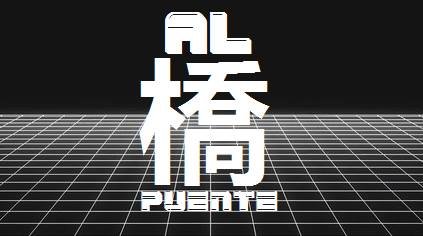
eres valor para la plataforma!
Tremendo artículo bro!!! 🔥🔥🔥🔥